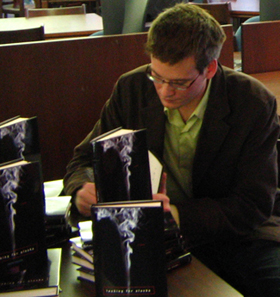 While that last quote might make you inclined to peg writers as "lazy," some of them actually have the mental gusto to pull a spectacular feat like publishing two novels in two years. Even in a reclining chair.
While that last quote might make you inclined to peg writers as "lazy," some of them actually have the mental gusto to pull a spectacular feat like publishing two novels in two years. Even in a reclining chair.
"With Alaska, it took four years to finish. So much of writing is discipline," Green says. "When you're writing your first novel, you don't have deadlines; no one cares if you finish it. With Alaska, I didn't want to do anything else. I was hyper-focused on doing it."
Of course, back then Green also had a full-time job he had to schedule his writing around. He read and reviewed books about the Islamic world for Booklist Magazine. Green had studied Religion and English at Kenyon College, Ohio, and for some time thought he would go to Divinity School and become an Episcopal Priest.
"I was interested in facilitating inter-religious dialogue between Christians and Muslims," Green says, all in one smooth sentence. "I was pretty serious about the idea for about a year after college, but then I realized I wanted to write."
Surprisingly enough, Green's fiction is not about heavy-duty religious conflicts, or "facilitating inter-religious dialogue." In fact, Looking For Alaska is so relevant and interesting that it's beating out PlayStations and the Internet for many teenager's attention. That — in itself — is quite a feat.
"My fiction is concerned with questions of existence, the important questions we ask ourselves about what it means to be a person," says Green.
There's more to that description, for the existentialist-wary. Looking For Alaska takes place at a small boarding school in Alabama. The main character, Miles Halter, is a guy who has a strange fascination with famous last words, and falls in love with a loud-mouthed, beautiful girl named Alaska.
"You can learn a lot about life from what people say when they're dying," Green says. "It's amazing how they find it possible to be funny."
He goes on to quote Oscar Wilde's last words; "Either that wallpaper goes, or I do."
Like the main character in Alaska, Green also went to a small boarding school in Alabama, after a rocky performance in public school.
"I was a terrible student. I had always wanted to go to boarding school. I'd heard stories about how much fun it was," Green says. "In Florida, I didn't really have that many friends, and I also hoped that if I had a fresh start at boarding school, people wouldn't know what a huge nerd I was."
- Comment








